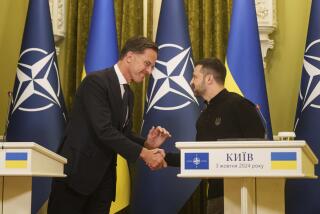NATO Vows to Support Macedonia
- Share via
BERLIN — NATO vowed Monday to deploy more peacekeepers to Kosovo’s border with Macedonia in an effort to cut ethnic Albanians’ supply lines and prevent another full-scale outbreak of Balkan bloodletting.
NATO and European Union officials assured Macedonia of their full economic and diplomatic support to hold the landlocked former Yugoslav republic together. But Russian President Vladimir V. Putin warned that the fighting was already spiraling out of control.
The limits of Europe’s power to effectively intervene in what it fears is an attempt by Kosovo and Macedonia Albanians to seize territory for a separate state were apparent in the conflicting reactions to the latest regional security crisis. The violence, if not controlled, threatens to send a new wave of refugees from the Balkans into Europe’s more developed countries.
NATO Secretary-General George Robertson pledged more troops for the alliance’s Kosovo peacekeeping mission after meeting with Macedonian Foreign Minister Sergan Kerim in Brussels. Macedonian leaders have harshly criticized the North Atlantic Treaty Organization for failing to cut the supply lines between Kosovo’s predominantly Albanian population and its ethnic brethren in northwestern Macedonia, where troops and tanks have been doing battle for the last six days.
“We’ll be asking individual members to add to the troops they have in Kosovo in order that more flexibility can be given to the task,” Robertson told reporters in Brussels. He declined to say how many reinforcements would be sent or what their mandate would be. He said only that the additional troops would pursue their objectives “with considerable vigor.”
Peacekeepers from NATO member nations and other countries still patrol parts of divided Bosnia-Herzegovina, as well as Kosovo, which is a province of Serbia, the larger republic of Yugoslavia. Kosovo remains an international protectorate two years after NATO forces waged an air war to halt the mass killing and “ethnic cleansing” of Kosovo Albanians.
In Washington, the Bush administration condemned the violence in Macedonia and said the U.S. “unequivocally” backs the nation’s efforts to protect the rule of law.
“Political grievances of the ethnic Albanian community should be addressed through the democratic structures of Macedonia’s multiethnic civil society and not through destabilizing violence. We think this is in the interest of all citizens of Macedonia,” State Department spokesman Richard Boucher said.
The White House said later that the administration is exploring ways to provide additional nonmilitary aid to Macedonia.
European Union foreign ministers meeting in Brussels assured Macedonia’s government that they would provide any needed political or economic backing to prevent partitioning of the only former Yugoslav republic that managed a peaceful breakaway from the federation nearly a decade ago.
But the EU’s planned 60,000-member rapid-reaction force, which is to be used to contain such regional conflicts, will be ready no sooner than 2003, leaving the bloc with no military cards to play.
“The message to all extreme groups is very clear: We do not accept violence, and our support for the [Macedonian] government is very clear,” Foreign Minister Anna Lindh of Sweden, which currently holds the EU presidency, told reporters in Brussels.
Austrian Foreign Minister Benita-Maria Ferrero-Waldner proposed that the EU call on the United Nations to discuss expanding the Balkans peacekeeping mission to include Macedonia. But only Greece, among 15 EU states, backed her.
European statesmen have been anything but united on how to proceed. The U.N. special envoy for the Balkans, former Swedish Prime Minister Carl Bildt, contends that war is already being waged in Macedonia, while German Foreign Minister Joschka Fischer and Defense Minister Rudolf Scharping cast Bildt’s assessment as an overreaction.
“Mr. Bildt should inform himself more precisely and be somewhat more calm and realistic in his comments than he has been in the last few days,” Scharping told reporters in Germany, which deploys thousands of peacekeepers in the Balkans and is responsible for the Kosovo-Macedonia border region near the fighting.
Fischer told his EU counterparts that he considered it premature to talk about expanding the peacekeeping mission and urged fellow Europeans “to discuss the situation calmly and responsibly.”
Russia, however, has urged immediate and resolute action.
A senior Russian Defense Ministry official, Col. Gen. Leonid Ivashov, was quoted by the Interfax news agency as saying Russian peacekeepers were willing and able to conduct a thorough search of Kosovo for illegal weapons. Kosovo Albanians were supposed to have been disarmed after the 1999 peacekeeping deployment, but many former fighters with the Kosovo Liberation Army are believed to be hiding arms and smuggling aid across the border to their ethnic allies in Macedonia.
*
Times staff writer Robin Wright in Washington contributed to this report.
More to Read
Sign up for Essential California
The most important California stories and recommendations in your inbox every morning.
You may occasionally receive promotional content from the Los Angeles Times.














